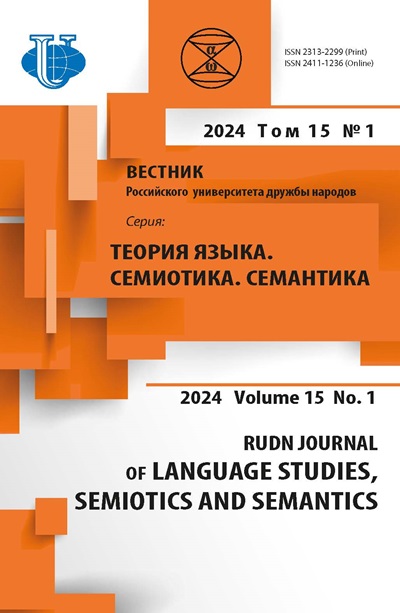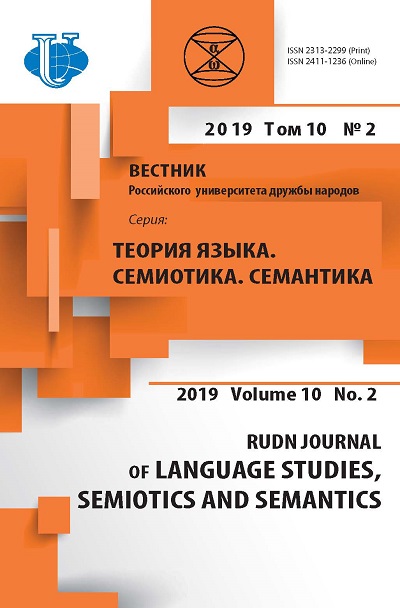ASPECTS OF EMPIRICAL UNDERSTANDING OF APHORISM
- Authors: Ivanov E.E.1
-
Affiliations:
- Mogilev State A. Kuleshov University
- Issue: Vol 10, No 2 (2019)
- Pages: 381-401
- Section: PHRASE RESOURCES
- URL: https://journals.rudn.ru/semiotics-semantics/article/view/21756
- DOI: https://doi.org/10.22363/2313-2299-2019-10-2-381-401
Cite item
Full Text
Abstract
Nowadays, modern linguistics pays much attention to the study of aphorism as a phrase text and a fixed phrase. In this regard, the analysis of the properties of aphorism, which characterize it in various types of discourse and spheres of communication, is particularly relevant. The article attempts to differentiate and describe various empirical understandings of aphorism. The purpose of the study is to establish and describe aspects and distinctive features of the empirical understanding of aphorism as a verbal means of expressing general judgments and universal generalization of reality in the form of phrase (phrase text). Research methods - heuristic, descriptive, taxonomic, generalization, analysis and synthesis. The material for the study are more than 100,000 aphoristic units taken from more than 300 handwritten and printed sources in Russian, Latin, English, German, French, Spanish and other languages. As a result, the notion of empirical qualification of aphorism is defined, it is a verbal means within this type of discourse or sphere of communication used in a particular social or cultural practice, the branch of knowledge (including scientific). Each particular empirical understanding of aphorism can be considered as one of the aspects of its general empirical understanding. Aspects of an empirical understanding of aphorism were formed at different times, emerged and developed in various national (or international) traditions, under the influence of various cultural trends and social processes, within the paradigms of scientific knowledge and linguocultures. It was established that there are only nine of the most significant empirical understandings of aphorism (scientific-philosophical, literary-philosophical, religious-literary, literary-fictional, literary-publicistic, literary-legal, folk-poetic, poetic-rhetorical, colloquial-linguistic understandings). Each of them forms a separate aspect of the empirical understanding of an aphorism based on a set of properties and functions (distinctive features), specific to the implementation of aphorism as a verbal means within a given social or cultural practice, the branch of knowledge. Introduction to the science the concept of “empirical understanding of aphorism” and the differentiation of aspects of such understanding is based on the use of aphorism in various types of discourse and spheres of speech communication, will allow to systematize aphoristic units as speech genres (scientific aphorisms, philosophical, literary, journalistic, legal, folklore, etc.), and also to distinguish the scientific directions of studying aphorism.
About the authors
Eugeney E. Ivanov
Mogilev State A. Kuleshov University
Author for correspondence.
Email: ivanov-msu@mail.ru
PhD, Associate Professor, Head of the Department of Theoretical and Applied Linguistics of Mogilev State A. Kuleshov University (the Republic of Belarus).
1, Kosmonavtov Str., Mogilev, Belarus, 212022References
- Ivanov, E.E. (2018). Linguistic aphorism. Minsk: Higher School Publ. (In Russ.).
- Ivanov, E. (2016). Aphorism as the Unit of Language and Speech. In EUROPHRAS 2016: Word Combinations in English, Abstract. Trier. pp. 42.
- Solopova, M.A. (2012). Vita brevis: to the interpretation of the first aphorism of Hippocrates. Philosophical Journal, 1 (8), 5—25. (In Russ.).
- Weissman, A.D. (1899). Greek-Russian dictionary. St. Petersburg. (In Russ.).
- Vernadsky, V.I. (1991). Scientific thought as a planetary phenomenon. Moscow: Nauka. (In Russ.).
- Obolensky, V.B. (2016). Aphorism as the language of philosophy. Orel. (In Russ.).
- Aphorisms of the Chinese sages, M.E. Loginov (Comp.). (2008). Moscow: Eksmo. (In Russ.).
- Aphorisms of the Indian sages, M.E. Loginova & A.M. Mikhailov (Comp.). (2008). Moscow: Eksmo. (In Russ.).
- Aphorisms of the Arab wise men, M.E. Loginov (Comp.). (2008). Moscow: Eksmo. (In Russ.).
- Ethics: a dictionary of aphorisms and sayings, V.N. Nazarov & E.D. Meleshko. (Comp.). (1995). Moscow: Aspect-press. (In Russ.).
- Pedagogy: dictionary of aphorisms and sayings, K.M. Khoruzhenko (Comp.). (2003). Rostovna-Donu: RSPU Publ. (In Russ.).
- Parshina, A.M. & Tikhonov, A.N. (Eds.). (2004). Aphorisms, mottos, unusual sayings in scientific work and in the process of studying metal science and physics of radiation damage. St. Petersburg: Polytechnic Publ. (In Russ.).
- Psychology and psychotherapy in aphorisms, K.V. Yagnyuk (Comp.). (2008). Moscow: ICSR. (In Russ.).
- Rustanovich, A.V. (Ed.) (2012). Psychopathology in aphorisms. St. Petersburg: ELBI. (In Russ.).
- Virchenko, N.A. (Ed.) (1983). Mathematics in aphorisms, quotes, statements. Kiev: Higher School Publ. (In Russ.).
- The wonderful world of physics: aphorisms, sayings, quotes, V.M. Andrianov (Comp.). (1996). Vinnitsa. (In Russ.).
- Philosophy: the history of the ancient period in the statements and aphorisms, N.B. Nechaev, M.B. Voskresenskaya (Comp). (2009). Kostroma: Kostroma University Press. (In Russ.).
- Achkasov, E.E. & Miskaryan, I.A. (Eds.) (2009). Medicine in aphorisms and winged expressions: from the beginnings to the present day. Moscow: Profile. (In Russ.).
- Gorokhov, V.N. (Ed.) (2013). About history and historians: thoughts, sayings, aphorisms from ancient times to the present day. Moscow: Book House. (In Russ.).
- Epstein, M.N. (1987). Aphoristics. In Literary encyclopedic dictionary. Moscow: Sov. encyclopedia. pp. 43—44. (In Russ.).
- Kozhevnikov, A.Yu. & Lindberg, T.B. (Eds.) (2012). Wise phrases and aphorisms of literary heroes. Moscow: OLMA Media Group. (In Russ.).
- Gvozdetskaya, N.Yu. (1995). Aphoristic statements in the context of the Old English poem “Beowulf”. In: Creativity of the writer and the literary process. Language of literature. Poetics. Ivanovo. pp. 112—124. (In Russ.).
- Kozhevnikov, A.Yu. & Lindberg, T.B. (Eds.) (2012). Biblical aphorisms, Moscow: OLMA Media Group. (In Russ.).
- Aphorisms. Scripture, V.G. Noskov (Comp.). (2010). Moscow: Avanta+; Astrel. (In Russ.).
- The wisdom of the Quran. (2008). Moscow: AST; Astrel. (In Russ.).
- Aphorisms of the Buddha. (2010). Moscow: Geleos. (In Russ.).
- Gomez de la Serna, R. (1983). Gregeria. In: Gomez de la Serna R. Works. Moscow: Khudozhestvennaya Literatura Publ. pp. 294—341. (In Russ.).
- Ivanov, E.E. (2016). Linguistic aphorism. Mogilev: Mogilev University Press. (In Russ.).
- Tronsky I.M. (1993) Cornelius Tacitus. In: Tacitus, Cornelius. Works: in 2 vol. Moscow: Nauka. Vol. 2. (In Russ.).
- Fedorenko, N.T. & Sokolskaya, L.I. (1990). Aphoristic. Moscow: Nauka. (In Russ.).
- Goncharova, N.A. & Antonyuk, M.G. (2009). Legal terms and aphorisms: Latin-RussianBelarusian dictionary. Minsk. (In Russ.).
- The labor code of the Russian Federation in aphorisms, S. Sidorov, V. Maleshin (Comp.). (2012). Moscow: Astrel. (In Russ.).
- A Dictionary of Law: Reissued with New Covers, E.A. Martin (Ed.). (2003). Oxford: Oxford University Press.
- Rybnikova, M.A. (1937). Introduction to the style. Moscow: Sov. pisatel. (In Russ.).
- Ivanov, E. & Petrushevskaia, Ju. (2015). Etymology of English Proverbs. Journal of Siberian Federal University. Humanities & Social Sciences, 8, 5, 864—872.
- Ivanov, E. & Petrushevskaya Ju. (2016). English Proverbs: from Literary Texts, in Literary Texts: Etymology, Usage, Variability. Mogilev: Mogilev University Press.
- Permyakov, G.L. (1970). From saying to a fairy tale. Moscow: Nauka. (In Russ.).
- Gasparov, M.L. (1987). Aphorism. In: Literary encyclopedic dictionary. Moscow: Sov. Encyclopedia. p. 43. (In Russ.).
- Explanatory dictionary of the Russian language for schoolchildren, S.G. Tryosguzov (Comp.). (2007). Moscow: RIPOL Classic. (In Russ.).
- Abramov, N. (1999). Dictionary of Russian synonyms and similar expressions. Moscow: Russian Dictionaries Publ. (In Russ.).
- Taylor, E.B. (1989). Primitive culture. Moscow: Direct Media. (In Russ.).
- Lomakina, O.V, & Mokienko, V.M. (2018). The value constants of the Ruthenian paremiology (against the background of the Ukrainian and Russian languages). Rusin, 4 (54), 303—317. (In Russ.).
- Belyanin, V.P. & Butenko, I.A. (1994). Live speech: a dictionary of colloquial expressions. Moscow: PAIMS. (In Russ.).
- Ivanova, N. (2010). The experience of linguistic study of Marthism. Blagoveshchensk: BSPU Press. (In Russ.).
- AiForismy: in 3 vol. (2008). Moscow: Arguments and Facts Press. (In Russ.).
- Anti-Proverbs and aphorisms, M.V. Adamchik (Comp.). (2011). Minsk: Harvest. (In Russ.).
- Ivanov, E.E. (2013). Aphoristic statements in “Rhetoric” by M.V. Lomonosov (for the formulation of the problem). In: M.V. Lomonosov in the history of science, culture, university education. Grodno: Grodno University Press. pp. 133—136. (In Russ.).
- Aphorismen. (1971). In: Meuegs Еnzуkloredisches Lekhikon. Mannhem. Bd. 2. p. 387.
- Dictionary of the Russian language: 4 vol., A.P. Evgenieva (Ed.). (1981). 2nd ed. Moscow: Russian Language Publ. Vol. 1. (In Russ.).
- Explanatory Dictionary of the Belarusian literary language, M.G. Sudnik, M.N. Krivko (Ed.). (1996). Minsk: Bel. Encyclopedia. (In Belarus.).
- Longman Dictionary of Contemporary English (2009). 5th ed. Pearson.
- Korolkova, A.V. (2005). Russian aphoristics. Moscow: Flinta; Nauka. (In Russ.).
- Ivanov, E.E. (2017). Aphoristic units in the Belarusian language. Mogilev: Mogilev University Press. (In Belarus.).













